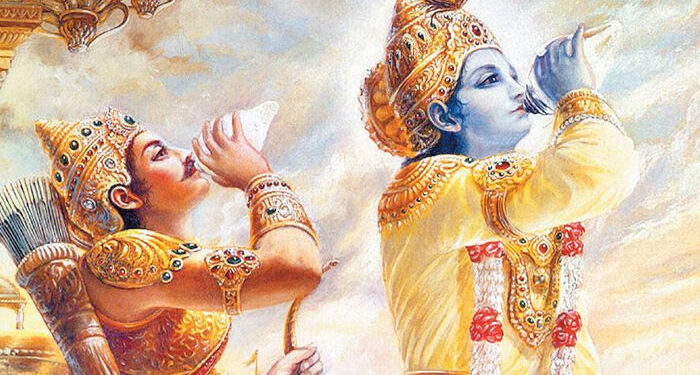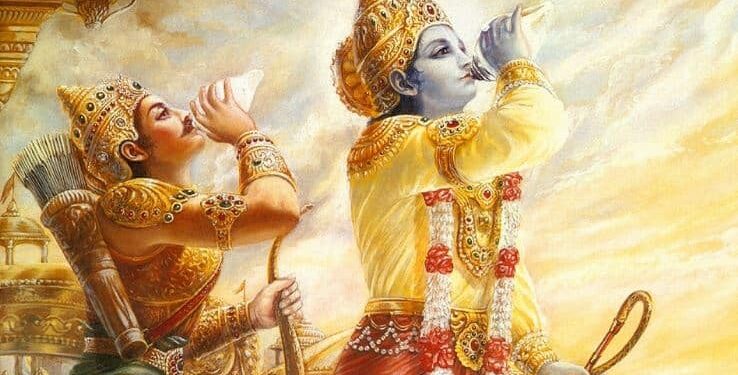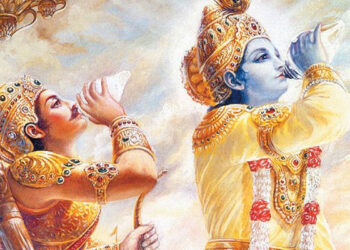TEXT 9
sañjaya uvāca
evam uktvā hṛṣīkeśaṁ
guḍākeśaḥ parantapaḥ
na yotsya iti govindam
uktvā tūṣṇīṁ babhūva ha
SYNONYMS
sañjayaḥ uvāca—Sañjaya said; evam—thus; uktvā—speaking; hṛṣīkeśam—unto Kṛṣṇa, the master of the senses; guḍākeśaḥ—Arjuna, the master of curbing ignorance; parantapaḥ—the chastiser of the enemies; na yotsye—I shall not fight; iti—thus; govindam—unto Kṛṣṇa, the giver of pleasure to the senses; uktvā—saying; tūṣṇīm—silent; babhūva—became; ha—certainly.
TRANSLATION
Sañjaya said: Having spoken thus, Arjuna, chastiser of enemies, told Kṛṣṇa, “Govinda, I shall not fight,” and fell silent.
PURPORT
Dhṛtarāṣṭra must have been very glad to understand that Arjuna was not going to fight and was instead leaving the battlefield for the begging profession. But Sañjaya disappointed him again in relating that Arjuna was competent to kill his enemies (parantapaḥ). Although Arjuna was, for the time being, overwhelmed with false grief due to family affection, he surrendered unto Kṛṣṇa, the supreme spiritual master, as a disciple. This indicated that he would soon be free from the false lamentation resulting from family affection and would be enlightened with perfect knowledge of self-realization, or Kṛṣṇa consciousness, and would then surely fight. Thus Dhṛtarāṣṭra’s joy would be frustrated, since Arjuna would be enlightened by Kṛṣṇa and would fight to the end.
TEXT 10
tam uvāca hṛṣīkeśaḥ
prahasann iva bhārata
senayor ubhayor madhye
viṣīdantam idaṁ vacaḥ
SYNONYMS
tam—unto him; uvāca—said; hṛṣīkeśaḥ—the master of the senses, Kṛṣṇa; prahasan—smiling; iva—like that; bhārata—O Dhṛtarāṣṭra, descendant of Bharata; senayoḥ—of the armies; ubhayoḥ—of both parties; madhye—between; viṣīdantam—unto the lamenting one; idam—the following; vacaḥ—words.
TRANSLATION
O descendant of Bharata, at that time Kṛṣṇa, smiling, in the midst of both the armies, spoke the following words to the grief-stricken Arjuna.
PURPORT
The talk was going on between intimate friends, namely the Hṛṣīkeśa and the Guḍākeśa. As friends, both of them were on the same level, but one of them voluntarily became a student of the other. Kṛṣṇa was smiling because a friend had chosen to become a disciple. As Lord of all, He is always in the superior position as the master of everyone, and yet the Lord agrees to be a friend, a son, or a lover for a devotee who wants Him in such a role. But when He was accepted as the master, He at once assumed the role and talked with the disciple like the master—with gravity, as it is required. It appears that the talk between the master and the disciple was openly exchanged in the presence of both armies so that all were benefitted. So the talks of Bhagavad-gītā are not for any particular person, society, or community, but they are for all, and friends or enemies are equally entitled to hear them.



















